- Home
- Pearl S. Buck
Come, My Beloved Page 2
Come, My Beloved Read online
Page 2
Leila was dead. That he must repeat to himself. He looked at David, standing quietly beside him, gazing not at the jewels but at the people.
“Shall we go?” he asked.
“Whenever you say,” David replied.
They climbed back into the vehicle to the disappointment of jewelers and beggars alike, and prodding the driver awake with his cane, MacArd pointed him back again to the English city, to the wide streets, the great houses of green and grey stone. There MacArd dismissed the wretched conveyance and they got into the horsedrawn streetcar for Malabar Point.
“An American named Kittredge built this streetcar system,” he informed his son, making conversation again.
“Did he?” David murmured.
They were passing the Cathedral and near it stood the statue of Lord Cornwallis, the Governor-General of India after England lost the American colonies, a statue raised, the guidebook said, by funds from the merchants of Bombay.
“Cornwallis,” MacArd said briefly, nodding at the haughty figure.
David looked and did not reply.
North of the bay stood the Towers of Silence. They had been told at the hotel that surely they must see the Towers. “A very interesting sight,” the clerk had informed them with condescension.
“Are you tired?” MacArd asked in sudden anxiety. His son’s cheeks were pale.
“I feel odd,” David said with some effort. “I feel smothered. It’s only the heat, I think.”
“We’ll get off and go back to the hotel,” MacArd said firmly. Again they descended, and catching a car returning from Malabar Point, they were within the half hour back in their rooms. Wahdi, asleep at the door, leaped to his feet. MacArd ignored him.
“You are not ill?” he insisted, gazing anxiously at his son.
“Oh no,” David protested. “Perhaps, again, it’s the ship. I seem to feel the sea still rising and falling. I will lie down.”
“I fetch you tea, Sahib.” Wahdi, hovering about them, increased the oppression of the atmosphere.
“Fetch it then,” MacArd commanded. “And David, take a cool sponge. It will refresh you.”
“Thanks, Father,” David said. “Don’t bother. I’ll drink the tea and be better.”
He longed to shut the door between the rooms but he did not wish to wound his father. He had never before been alone with his father for days and weeks. There had always been his mother between them, and now she was no more. He must learn to live without feeling oppressed by this powerful personality. He smiled at his father and then taking courage he shut the door between them.
In his bathroom MacArd poured water over himself in the fashion that the guidebook had suggested to them. He stood on the sloping stone floor and with the metal dipper he dipped up water from a large porcelain jar and poured it over his head and shoulders. It was refreshing, he had to admit, feeling the rills of water running down his white body, the dead white of the red-haired, so much less beautiful than Leila’s lovely cream color. That abundant joy was his no more. He strove to be stern with himself, to repress the vitality of his vigorous frame. He must shape all his time now to other ends, undertake new work, busy himself—but with what? While she lived, his life was full every hour of the day and night, and now, suddenly it all had come to an end and so quickly that still he could scarcely believe it. Her heart, which none had suspected, had in the night, a night like any other, simply ceased to beat, without reason, without will, a mystery except that in her pretty, wilful way she never went to doctors. Not since David’s birth and the painful operation after it, which had made it evident that there would be no more children, never after those weeks in the hospital had she been willing to have a doctor. She treated herself in secret ways and he knew it only because he found bottles of medicine sometimes on her table. Then, terrified, he demanded to know if she suffered pain or felt ill and she never would tell him. She had laughed at him and had showed him her lovely round arms and had bade him look at the color of her cheeks.
“Do I look like an invalid?” she had demanded.
What could he say but the truth that she looked like health itself? Afterwards the bright eyes and the quick vivid color were, the doctor said, the very signs of death.
MacArd gave a groaning sigh as he remembered, and then wrapping his linen bathrobe about him, he sat down in a deep wicker chair in his bedroom. Immediately the weight of his loneliness, his distance from home, the knowledge that even though he returned to his house it would be empty for him, overcame him, and he closed his eyes and leaned back his head. He had not for years really prayed to God, although it was his nightly habit, because it had been Leila’s, to kneel at his bedside for a few minutes. Sometimes he had prayed during those minutes, but usually it had been sheer pretense, the wish not to hurt his wife, who had the habit of devoutness natural to her generation and his. Since her death he had put aside pretense, but suddenly now here in this distant room in India, prayer burst articulate from his frantic heart.
“Oh God, show me what to do with my life and my money that in the end I may rejoin my beloved wife in heaven!”
He did not doubt for one moment that Leila was in heaven, if there were such a place, for she had been a tender woman of such goodness and purity that she had already been an angel on earth. That she was ever petty or that she had ever made him impatient seemed impossible to him, and he thought now of such moments as entirely his own fault, although he had not always recognized it so when she was alive. She had sometimes complained against him because, she said, he was only interested in making money. It was true. His life had been absorbed in establishing the vast network of his interests. He had founded his fortune in railroads, and he was still the president of that, his oldest corporation, but railroads, as half a dozen men in his country knew, were merely arteries for trade, and now, with the nineteenth century in its last decade, the young and hungry country in which he had grown up yearned for more railroads and more trade. To pursue his golden way had been his business, but it had been his excitement and achievement, too. It had been fun as well as glory, and he did not care how much of his money Leila gave away. He liked to see his wife’s name heading a charity, “Mrs. David Hardworth MacArd, five thousand dollars.”
What did Leila want him to do now?
He held his eyes tightly shut, surprised at the cry from within himself and even a little frightened. Were there secrets that he did not know? He was a practical man, he had no time to read books, although he used to enjoy listening to Leila tell him about the books she read, and since her death he had opened some of them, seeking to recover the sound of her voice and the vision of her tender face. But without her the pages were dead. Where then could he find out about her now?
“Oh, Leila, honey,” he muttered, teeth clenched, “can’t you break through to me somehow?”
He sat rigid and listening, and he heard unrecognized sounds rising from the streets, high wailing voices speaking unknown tongues, voices as mournful as a dirge, mingled with the sharp cry of the beggars. His loneliness became agony and something as near terror as he could feel lent energy to his soul, searching for lost love. Certain words that had haunted his childhood in the country manse sprang alive in his memory, and he heard his father’s big voice declaiming scriptures from the pulpit.
“It is easier for a camel to pass through The Eye Of The Needle than it is for a rich man to enter The Kingdom of Heaven.”
Why, this was a monstrous thing to remember, for he was a very rich man, and it was not like Leila to remind him of it, but maybe she was doing it because it was the only way she could do it, through his memory. He used to hear those words when he was a small boy, bitterly poor with his family, and none of them had ever seen a rich man and he used to wonder what a rich man did and what he had to eat and to wear, and when he was a rebellious adolescent, he wanted to be a rich man because that was the kind of man his father had hated, a man who could never go to heaven. So maybe this was Leila’s way of telling him that t
hose old words were true and if he wanted to get to heaven where she was he had to do something good now with his money.
He was distracted here by the door opening slowly, inch by inch and he saw Wahdi, smiling at him. He came in on tiptoe, bearing a tea tray, and from his right hand hung an immense basket of white flowers.
“From Govmint, Sahib,” Wahdi said proudly. “A chit, Sahib, telling all.” He set the tray on the table, put down the basket and took from his bosom a large square envelope and gave it to MacArd. Then he stepped back and stood proudly while he waited.
MacArd tore open the heavy paper and drew forth a single sheet embossed with the insignia of the English crown. There was nothing formal, however, in the handwritten message, signed by the Governor-General himself.
Dear Mr. MacArd,
We shall be delighted if you care to have tiffin with us privately either Tuesday or Thursday without other guests, and shall quite understand if you don’t. I have given instructions that you are to see what you like in the city and that reservations are to be made on whatever railroad you choose to travel. We understand the tragic circumstances of your visit and shall await your inclination.
Yours, etc.
MacArd was not deceived. He was not a conceited man, but he was proud. He was invited to the Governor-General’s mansion because he was rich, and wealth was his pedestal.
The incident restored MacArd to himself. He had been shaken, but he must wait. He must think things over, he told himself. Meanwhile here was this invitation.
He pondered it while Wahdi waited majestically, sharing the glory of a master who received flowers from Malabar Point. MacArd’s Scotch blood, inherited two hundred years ago from Scottish ancestors who did not wish to be vassals of Englishmen, tempted him to toy with the idea of refusing the invitation. Courteously as it was worded, it was nevertheless a summons. His prudence conquered. Some time or other he might want to do business in India. It seemed unlikely, but it was within the imagination that railroads might make some day a network around the world, connecting with vast steamship companies. It was an age of expansion. He went to the teakwood desk and wrote a brief note of acceptance. Wahdi received it as an honor and bestowed it upon the waiting messenger outside the door with the air of one conferring gifts.
“We have given the Indian people an extraordinary freedom,” the Governor-General was saying. “In the old days they wouldn’t have thought of criticizing Government. Now, however, British tradition has taken the young Indian intellectuals by storm. We’ve taught them English and they have read our English newspapers and have learned our ways. They read our vigorous and independent editorials, not understanding that in England criticism does not mean disloyalty, and so they criticize us and are disloyal. It began in the time of my predecessor, but it crystallized at the first meeting of the Indian National Congress some few years ago. I hope it may not lead to final rebellion. Lord Lytton felt it very wrong and he passed an Act for controlling the native press, but it was repealed four years later. We English are incurably conscientious and Indians are not used to that.”
A turbaned manservant in a bright scarlet tunic, white trousers and gold belt, waited at his elbow and he helped himself to curry and rice, a pheasant curry delicately seasoned for the English palate.
“Who are the leaders?” MacArd inquired.
There were only the four of them at the long table, and although he faced David, his host and hostess were so distant that he repressed an inclination to raise his voice.
“The young intellectuals, the leftists, as remote from the peasants and the small town and country people as you and I are,” the Governor-General declared.
“Will they be able to persuade the peasants to follow their lead?” MacArd inquired. He disliked curry and took only a little of the dish which the gorgeously garbed Indian servant now held at his left.
“If we keep on educating the Indians in English schools there’s no telling what will become of the Empire,” the Governor-General said frankly. He went on, his disarming smile belying his words and the stiffness of his tall thin frame encased in a white linen suit. “We destroy ourselves, we English. We can’t be proper tyrants. We insist upon our conscience and it makes tyranny impossible.”
David listened, his dark eyes calm. MacArd was proud of his son, sitting there at the vast table at ease, yet with suitable deference in the presence of his elders and of dignity. The Marquess was looking at him, too, and he saw her rather cold blue eyes soften.
“My two sons are in England,” she said suddenly to David. “The elder is only sixteen. They left India when they were five and eight. We kept Ronald later than usual so that Bertie could go with him. I haven’t seen them now for three years.”
“You are going home again in May, my dear,” her husband reminded her.
“I only hope they still remember me, as I am, I mean, and not as a sort of maternal figure,” she said.
“It’s one of the many prices of Empire,” he remarked.
“Ah, but the women pay for it,” she said rather sharply.
MacArd turned to the Governor. “I guess you, too, have missed your sons, though.”
“Yes, certainly,” the Governor-General replied, “yet I yield to my wife. It’s quite true that she misses them more than I do, and also that I have rewards that she has not. English women have a difficult time of it in India, I’m afraid.”
The long elaborate meal drew to its close, and they rose, the Governor-General saying that since his wife was the only woman, they would not linger at table while she sat alone in the drawing room, and so they left the dining room with her.
The palace at Malabar Point was a series of bungalows, the many rooms were large and cool, and the doors opened upon deep verandas shaded by great trees and flowering vines. MacArd had been in the White House, summoned to Washington by the President before he set out for India, but this palace was far more magnificent and nothing was more magnificent than the Governor-General’s own bodyguard. The tall Sikhs, their faces dark under huge and intricate turbans, were splendidly handsome above their scarlet uniforms. MacArd had seen them at the gatehouse, where they stood with their long spears, watchful and waiting. They had none of the servile humility of the crowds on the streets. They were soldiers of Empire, and rejoiced in what they were.
He was compelled to acknowledge, as they reached the blue and gold drawing room, that the Englishman and his wife were worthy enough of their position. Titled in their own right, both tall and equally blond, they carried themselves with a simple and powerful dignity which he could not but admire, and could not but acknowledge, too, was not to be found in his own country. Only men and women who had lived for generations above competition could maintain such serene confidence in what they were. In his own country all were subject to competition. He himself had fought and struggled to reach his present height, and it would be impossible for him to pretend either to dignity or serenity. Such dignity as he had was the result of sheer physical mass, his six feet three now the more imposing because he was no longer the slight fellow he had been when he was young, although he had kept his figure well enough. He wore his London suit of tropical pongee with sufficient ease, and David was handsome in white linen. He saw the Marquess look at his son again and again and at last she forgot her remoteness and motioned to him with a wave of her long narrow jeweled hand to come and sit on the sofa beside her, which David did, without appearing absurd. His mother’s sense of humor, that dark sparkling laughter which MacArd had so loved to see in his wife’s eyes, had kept their son from self-consciousness or conceit.
“Never forget that your grandfather was a country preacher,” Leila used to tell the boy, “but a very good one because he was your father’s father,” she had always added, dimpling.
“Tell me what you have chosen for your career,” the Marquess was saying to David in a sweet coaxing voice.
“I don’t know yet, ma’am,” David said. “I have just finished college.”
<
br /> “College?” she repeated.
“Harvard.”
“Is it the same as Oxford and Cambridge?”
“I think so.”
She smiled at him with a distant tenderness. “And so you have no inclination?”
“Not yet, ma’am,” David acknowledged. “Perhaps this journey with my father will reveal something.”
“He can always come into my offices,” MacArd said.
“Oh, but you won’t make him?” she asked almost pleadingly.
“Certainly not,” MacArd replied. “He needn’t do anything, so far as I am concerned, although I think he’ll want to make some sort of place for himself.”
“No interests?” she asked, looking at David again.
“Too many,” he said frankly.
She refrained from more questions, her delicate reserve descended upon her again, but she rose and went to the rosewood piano and brought two large gold framed photographs.
“These are my sons,” she said.
David took the photographs, one and then the other, and looked into two thin serious faces. The photographs were finely colored and both boys were blond, blue-eyed and pink-cheeked.
“Look at those cheeks,” their mother murmured. “They couldn’t have had them here in India.”
“Oh, it’s quite impossible to keep English children here,” the Governor-General said.
His rather sharp voice served some sort of notice upon his lady and she said no more. She put the photographs quietly down on the couch beside her and motioned to a resplendent man servant to fill her small gilt cup again with coffee.

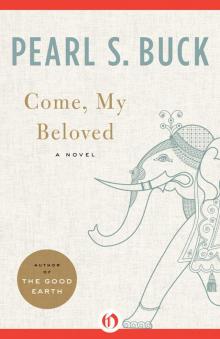 Come, My Beloved
Come, My Beloved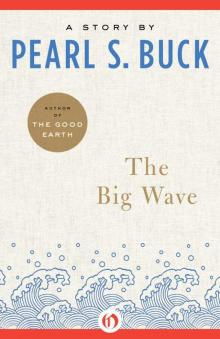 The Big Wave
The Big Wave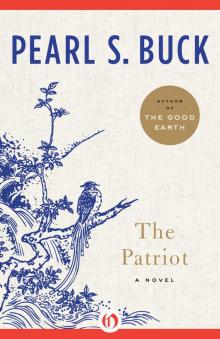 The Patriot
The Patriot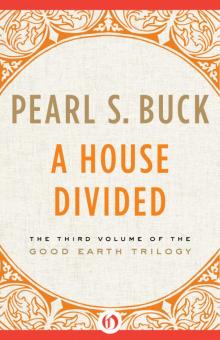 House Divided
House Divided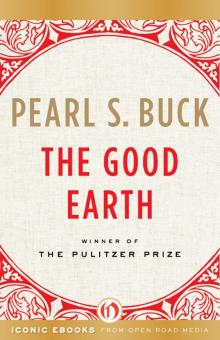 The Good Earth
The Good Earth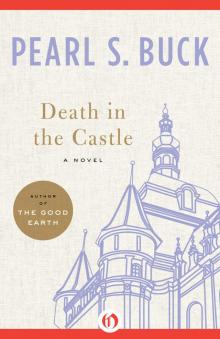 Death in the Castle
Death in the Castle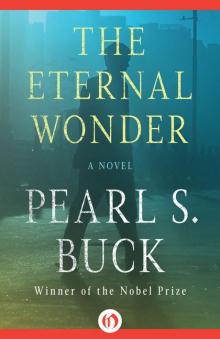 The Eternal Wonder
The Eternal Wonder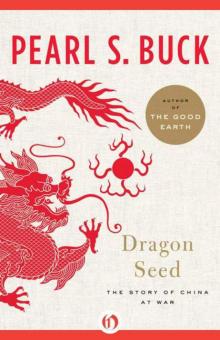 Dragon Seed: The Story of China at War
Dragon Seed: The Story of China at War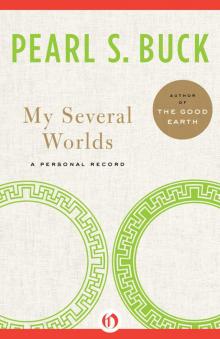 My Several Worlds: A Personal Record
My Several Worlds: A Personal Record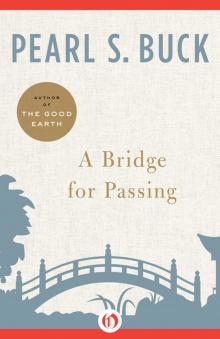 A Bridge for Passing: A Meditation on Love, Loss, and Faith
A Bridge for Passing: A Meditation on Love, Loss, and Faith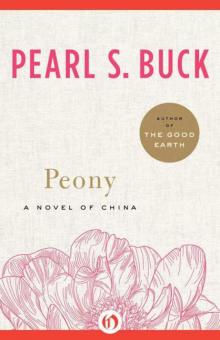 Peony
Peony East Wind: West Wind: The Saga of a Chinese Family
East Wind: West Wind: The Saga of a Chinese Family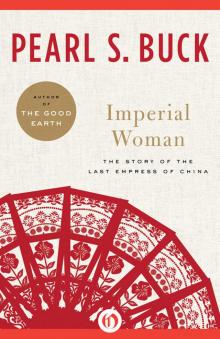 Imperial Woman
Imperial Woman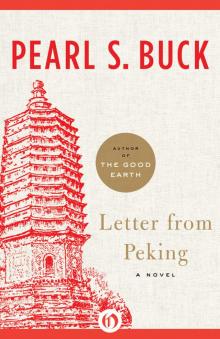 Letters From Peking
Letters From Peking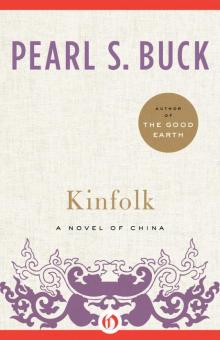 Kinfolk
Kinfolk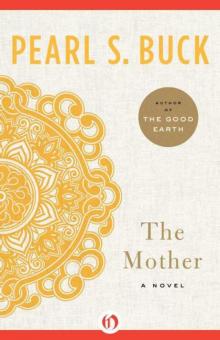 The Mother
The Mother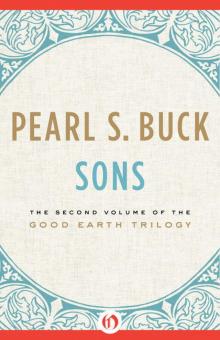 Sons
Sons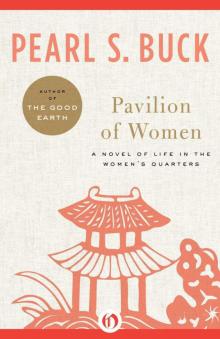 Pavilion of Women
Pavilion of Women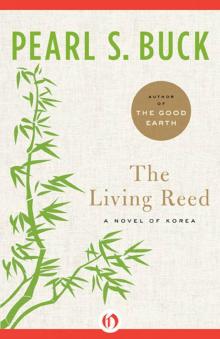 The Living Reed: A Novel of Korea
The Living Reed: A Novel of Korea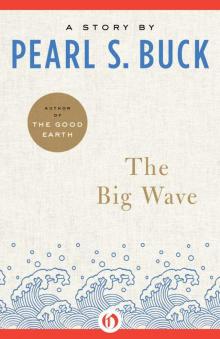 The Big Wave: A Novel
The Big Wave: A Novel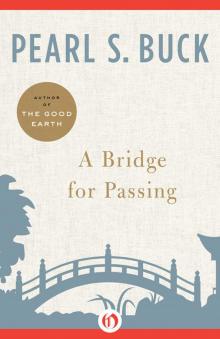 Bridge for Passing
Bridge for Passing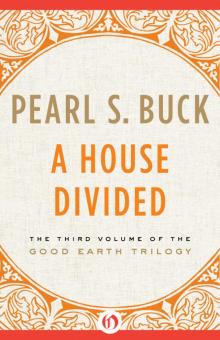 A House Divided
A House Divided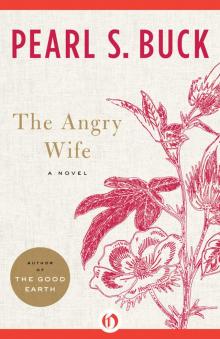 Angry Wife
Angry Wife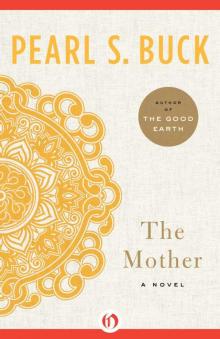 The Mother: A Novel
The Mother: A Novel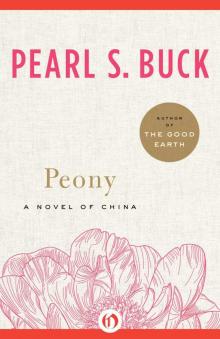 Peony: A Novel of China
Peony: A Novel of China East Wind: West Wind
East Wind: West Wind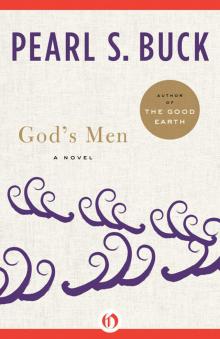 Gods Men
Gods Men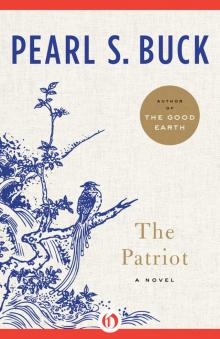 Patriot
Patriot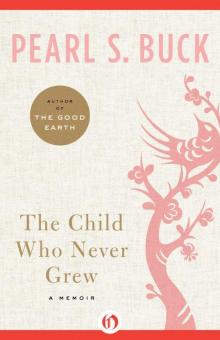 The Child Who Never Grew (nonfiction)
The Child Who Never Grew (nonfiction)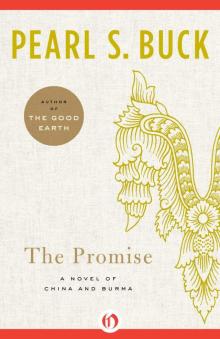 The Promise: A Novel of China and Burma (Oriental Novels of Pearl S. Buck)
The Promise: A Novel of China and Burma (Oriental Novels of Pearl S. Buck)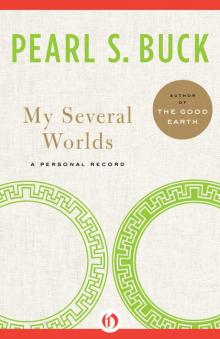 My Several Worlds
My Several Worlds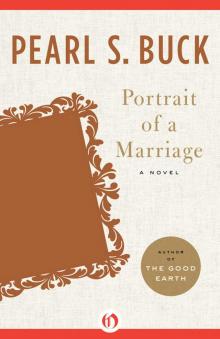 Portrait of a Marriage
Portrait of a Marriage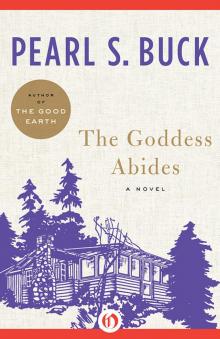 The Goddess Abides: A Novel
The Goddess Abides: A Novel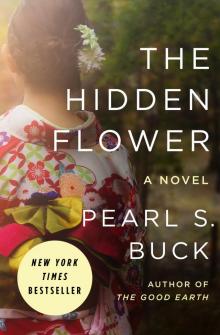 Hidden Flower
Hidden Flower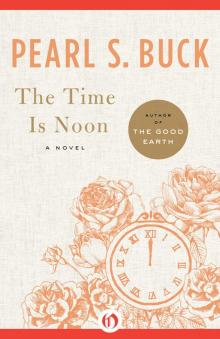 Time Is Noon
Time Is Noon